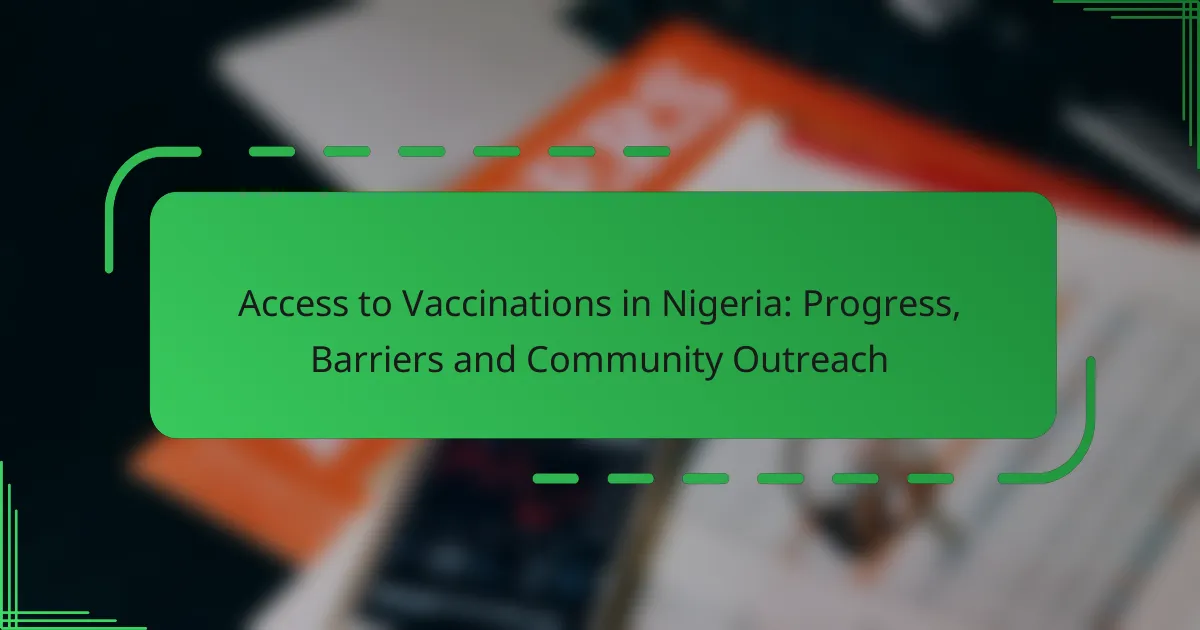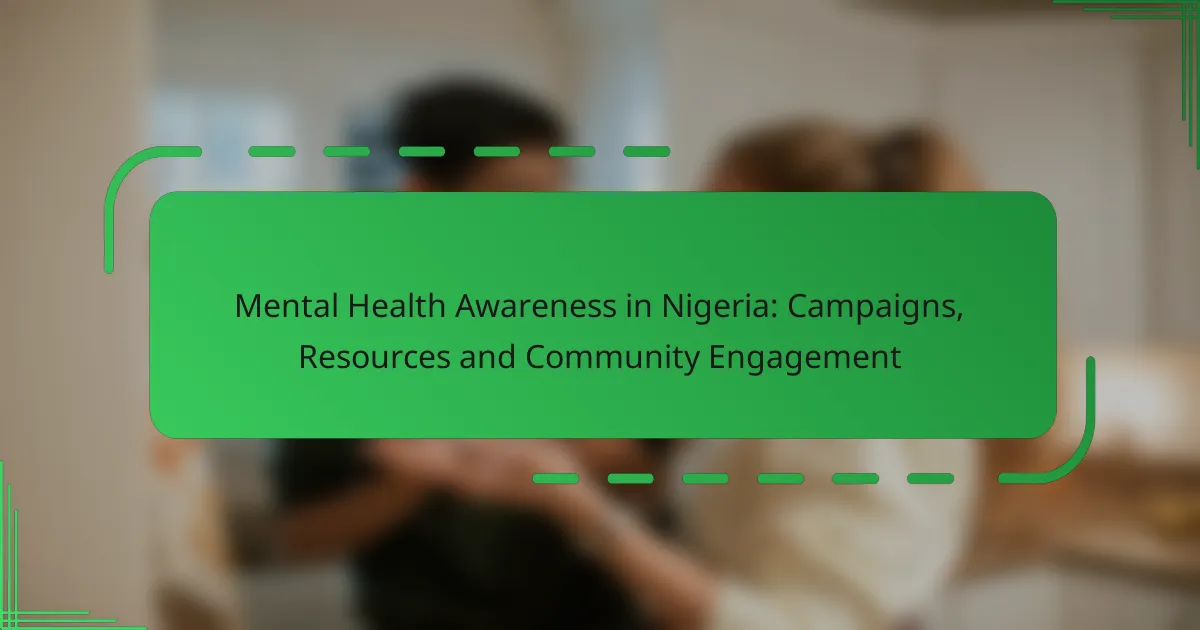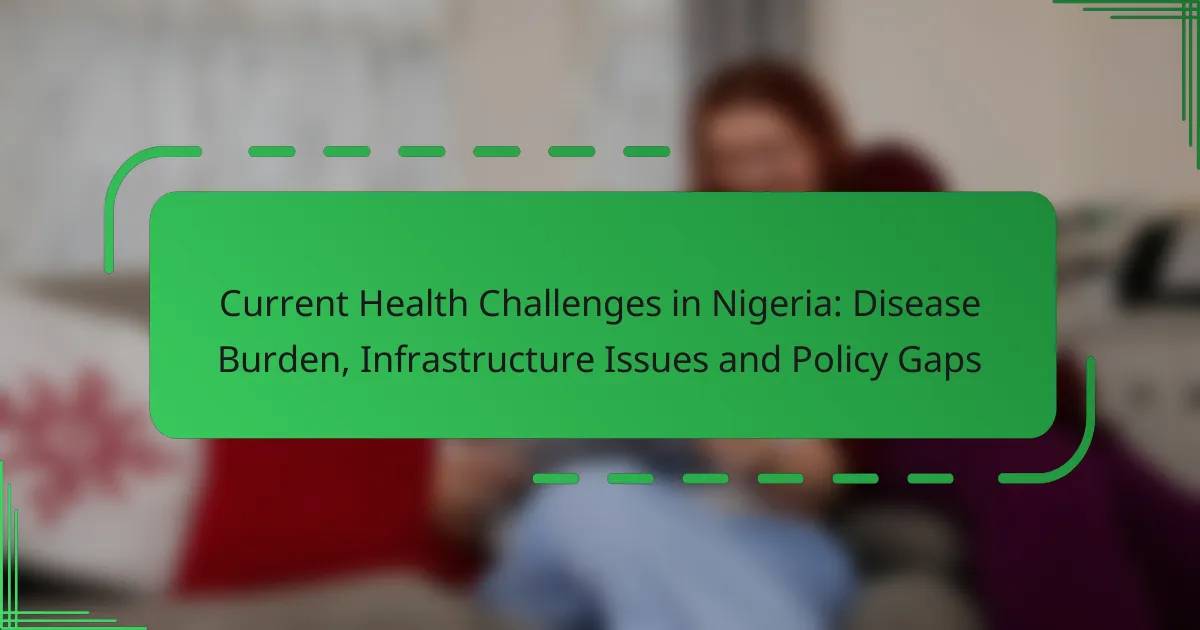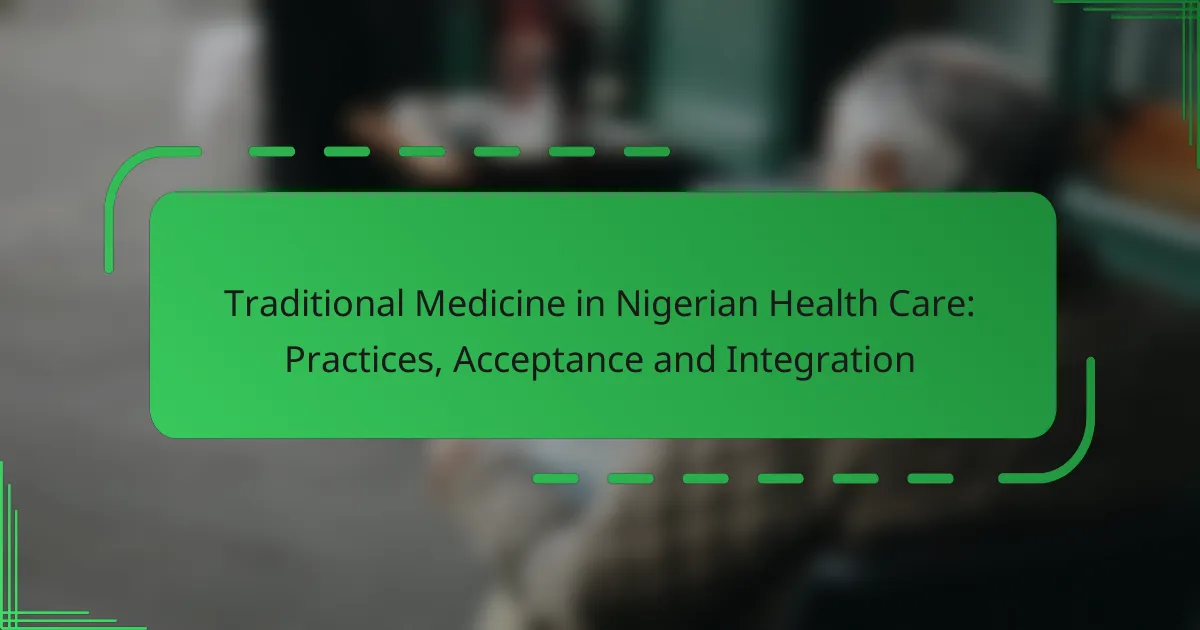Access to vaccinations in Nigeria has seen notable progress through government-led initiatives and innovative outreach strategies aimed at improving coverage. However, significant barriers such as inadequate healthcare infrastructure, supply chain issues, and cultural misconceptions continue to challenge these efforts. Community outreach plays a crucial role in overcoming these obstacles by raising awareness and fostering engagement, ultimately enhancing participation in vaccination programs.
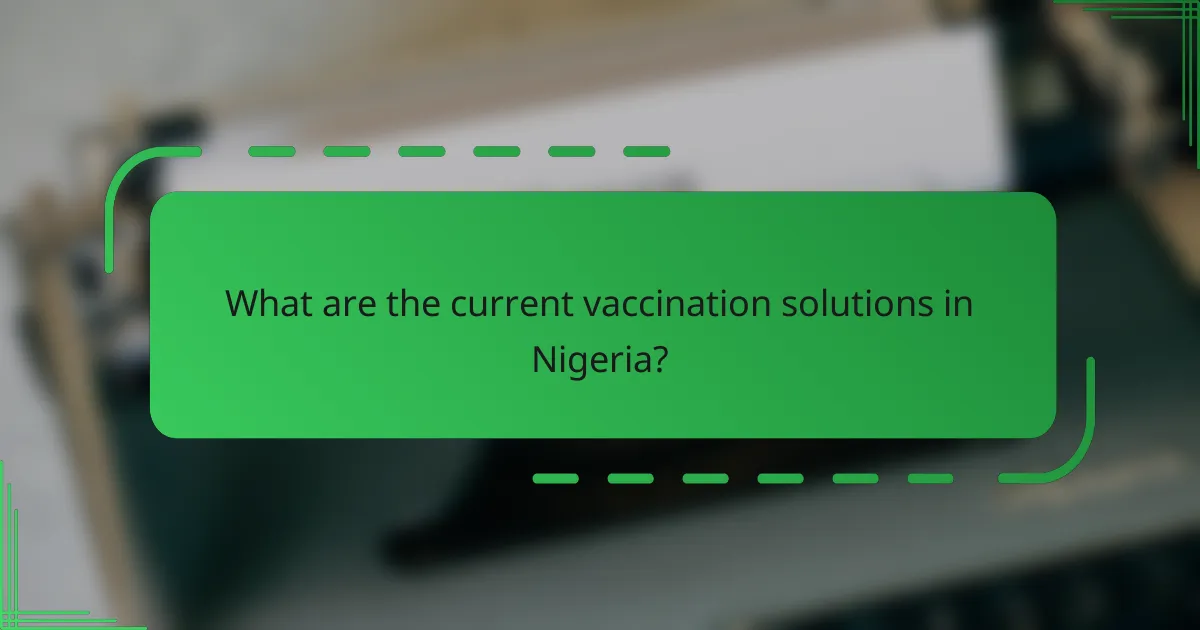
What are the current vaccination solutions in Nigeria?
Nigeria employs several vaccination solutions to enhance access and coverage, including government-led programs and innovative outreach strategies. These solutions aim to address the challenges of accessibility and public awareness in various communities.
Expanded Immunization Program
The Expanded Immunization Program (EIP) in Nigeria focuses on providing a comprehensive schedule of vaccines for children and pregnant women. This program includes vaccines for diseases such as measles, polio, and hepatitis B, ensuring that essential immunizations are available at no cost.
To improve participation, the EIP often collaborates with local health facilities and community leaders. Regular immunization campaigns are conducted, particularly in underserved areas, to raise awareness and encourage families to vaccinate their children.
Mobile vaccination units
Mobile vaccination units are a crucial strategy in Nigeria to reach remote and hard-to-access populations. These units travel to various locations, providing vaccinations on-site, which helps to eliminate barriers such as transportation and distance.
These units are equipped with necessary medical supplies and staffed by trained health workers. They often operate during community events or market days to maximize outreach and ensure that more individuals can receive their vaccinations conveniently.
Public-private partnerships
Public-private partnerships (PPPs) play a significant role in enhancing vaccination efforts in Nigeria. These collaborations between government entities and private organizations help to mobilize resources, expertise, and technology for vaccination campaigns.
For instance, private companies may contribute funding or logistical support, while public health agencies provide regulatory oversight and access to communities. This synergy can lead to more efficient vaccination drives and improved public health outcomes.
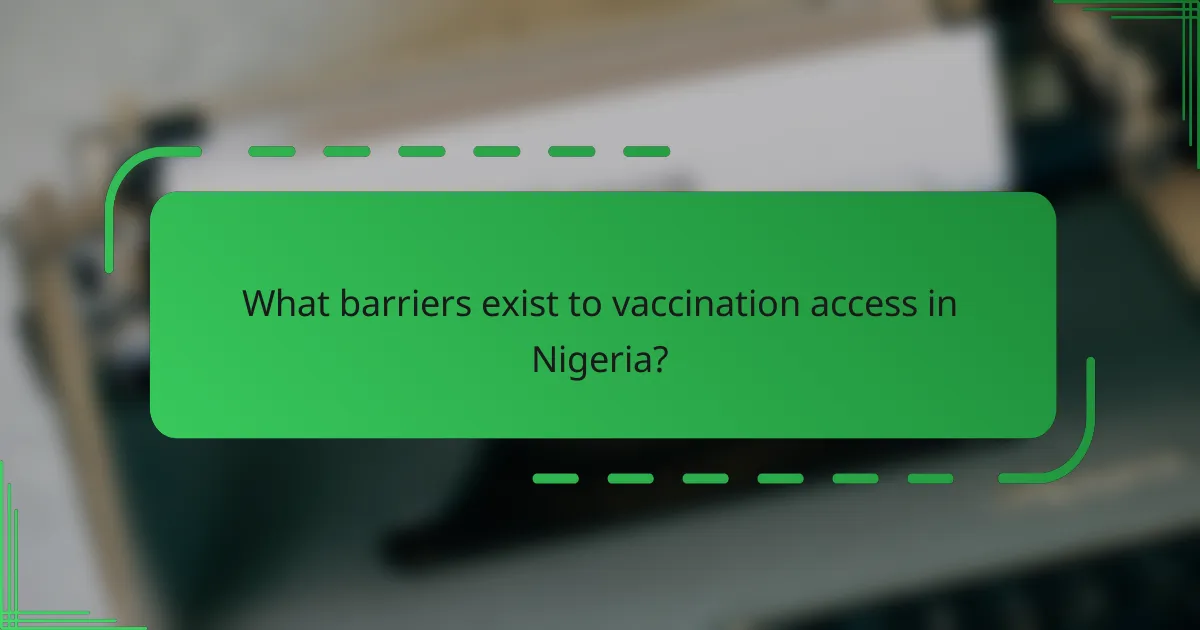
What barriers exist to vaccination access in Nigeria?
Access to vaccinations in Nigeria is hindered by several significant barriers, including inadequate healthcare infrastructure, supply chain disruptions, and cultural misconceptions about vaccines. These factors collectively impact the effectiveness of vaccination campaigns and overall public health outcomes.
Healthcare infrastructure challenges
Nigeria faces considerable healthcare infrastructure challenges that limit vaccination access. Many rural areas lack adequate health facilities, trained personnel, and essential medical equipment, making it difficult for communities to receive vaccinations. This often results in lower immunization rates, particularly in underserved regions.
Additionally, the distribution of healthcare resources is uneven, with urban centers typically receiving more attention and funding than rural areas. Strengthening healthcare infrastructure is crucial to improving vaccination access and ensuring that all populations are reached effectively.
Supply chain disruptions
Supply chain disruptions significantly affect the availability of vaccines in Nigeria. Factors such as poor transportation networks, inadequate cold storage facilities, and logistical inefficiencies can lead to delays in vaccine delivery and spoilage. These issues are particularly pronounced in remote areas where access to reliable transportation is limited.
To mitigate these disruptions, it is essential to enhance the supply chain management systems, ensuring that vaccines are delivered efficiently and stored properly. Collaboration between government agencies and private sectors can help streamline these processes and improve overall vaccine accessibility.
Cultural misconceptions about vaccines
Cultural misconceptions about vaccines pose a substantial barrier to immunization efforts in Nigeria. Misinformation regarding vaccine safety and efficacy can lead to hesitancy among communities, resulting in lower vaccination rates. Some individuals may believe that vaccines cause more harm than good, which can be exacerbated by anecdotal stories and social media influence.
Addressing these misconceptions requires targeted community outreach and education initiatives. Engaging local leaders and healthcare workers to provide accurate information about vaccines can help build trust and encourage vaccination uptake among hesitant populations.
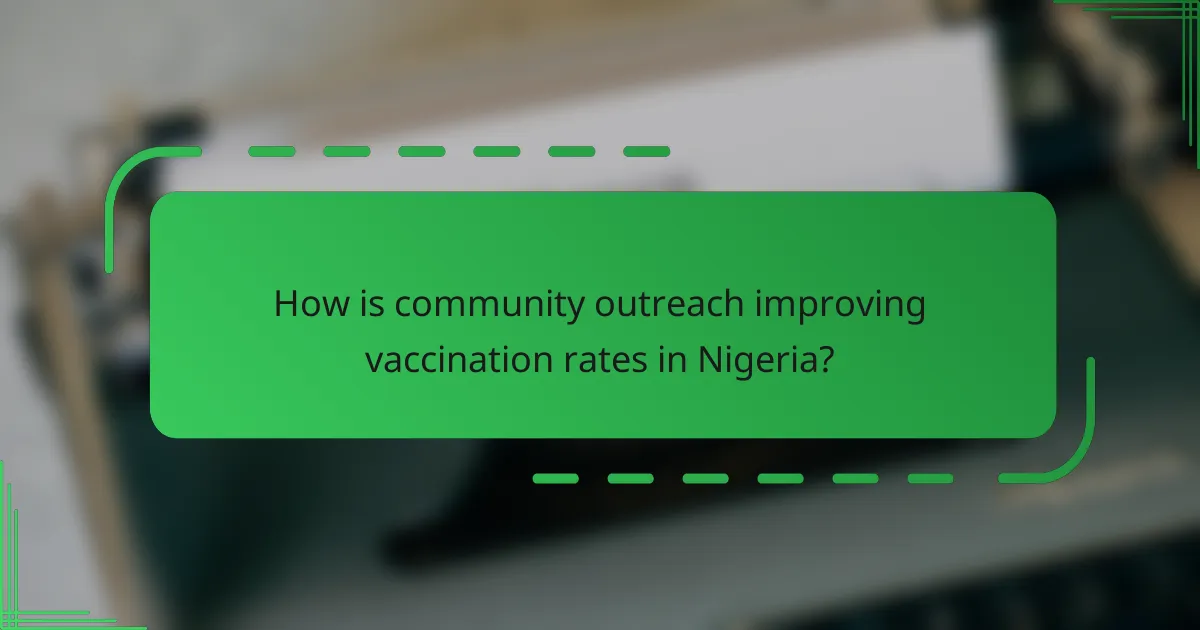
How is community outreach improving vaccination rates in Nigeria?
Community outreach is significantly enhancing vaccination rates in Nigeria by raising awareness and addressing misconceptions about vaccines. Through targeted efforts, communities are becoming more informed and engaged, leading to increased participation in vaccination programs.
Local health campaigns
Local health campaigns play a crucial role in improving vaccination rates by tailoring messages to specific communities. These campaigns often include door-to-door outreach, informational sessions, and health fairs that provide direct access to vaccination services.
For instance, campaigns may focus on areas with low vaccination coverage, using local languages and culturally relevant materials to communicate effectively. This localized approach helps to build trust and encourages families to vaccinate their children.
Collaboration with community leaders
Collaboration with community leaders is essential for fostering trust and credibility in vaccination initiatives. Leaders can influence public opinion and motivate community members to participate in vaccination programs.
By involving respected figures such as religious leaders and local chiefs, health organizations can leverage their influence to dispel myths about vaccines and promote their benefits. This partnership often leads to higher turnout at vaccination events.
Use of social media for awareness
Social media is increasingly being used to raise awareness about vaccination in Nigeria, especially among younger populations. Platforms like Facebook, Twitter, and WhatsApp allow health organizations to disseminate information quickly and engage with the community.
Effective social media campaigns often include testimonials, infographics, and live Q&A sessions to address concerns and share success stories. This digital outreach complements traditional methods and helps to reach a broader audience, ultimately improving vaccination rates.
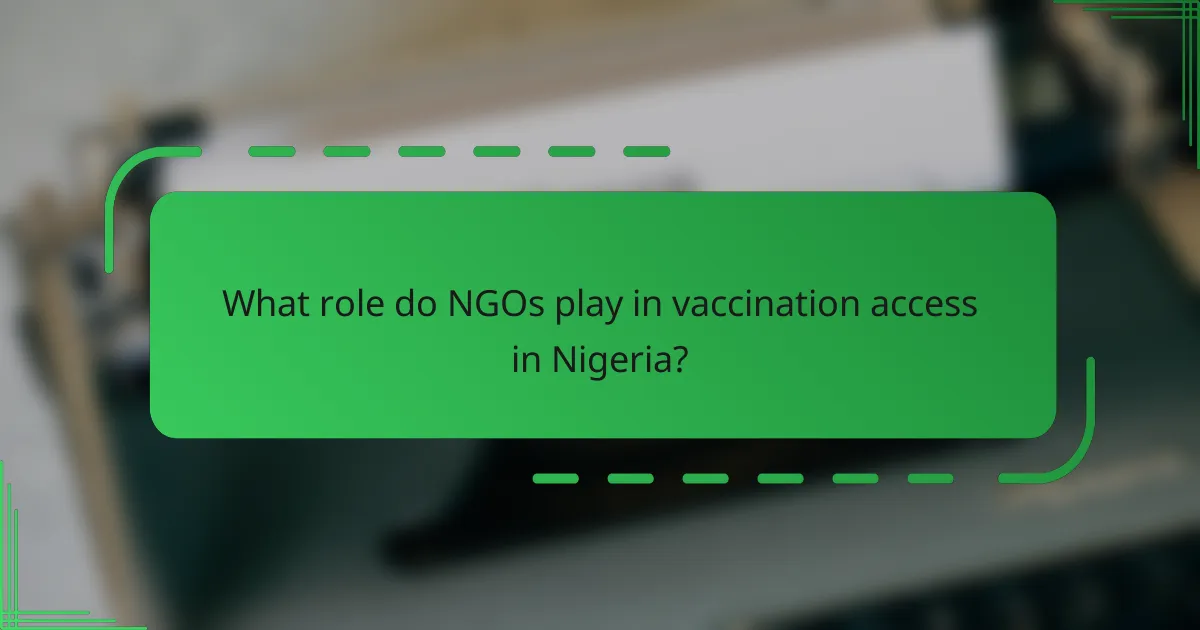
What role do NGOs play in vaccination access in Nigeria?
Non-governmental organizations (NGOs) significantly enhance vaccination access in Nigeria by providing essential resources, training, and outreach efforts. They collaborate with government bodies and local communities to address barriers and ensure that vaccines reach underserved populations.
Funding vaccination programs
NGOs often provide critical funding for vaccination programs, especially in regions where government resources are limited. They may allocate grants or donations to support the purchase of vaccines, transportation, and logistics necessary for effective distribution.
For example, organizations like Médecins Sans Frontières (Doctors Without Borders) have been known to fund immunization campaigns in remote areas, ensuring that children receive necessary vaccinations despite infrastructural challenges.
Training healthcare workers
Training healthcare workers is another vital role played by NGOs in Nigeria’s vaccination efforts. They conduct workshops and training sessions to equip local health personnel with the skills needed to administer vaccines safely and effectively.
Through these training programs, NGOs help improve the knowledge of healthcare workers regarding vaccine storage, handling, and patient communication, which is crucial for increasing vaccination rates and community trust.
Conducting outreach initiatives
NGOs conduct outreach initiatives to raise awareness about the importance of vaccinations in communities across Nigeria. These initiatives often include informational campaigns, community meetings, and collaboration with local leaders to dispel myths and encourage participation in vaccination programs.
Additionally, NGOs may organize mobile vaccination clinics that travel to remote areas, making it easier for families to access vaccines without the need for long-distance travel. This approach has proven effective in increasing vaccination coverage in hard-to-reach populations.
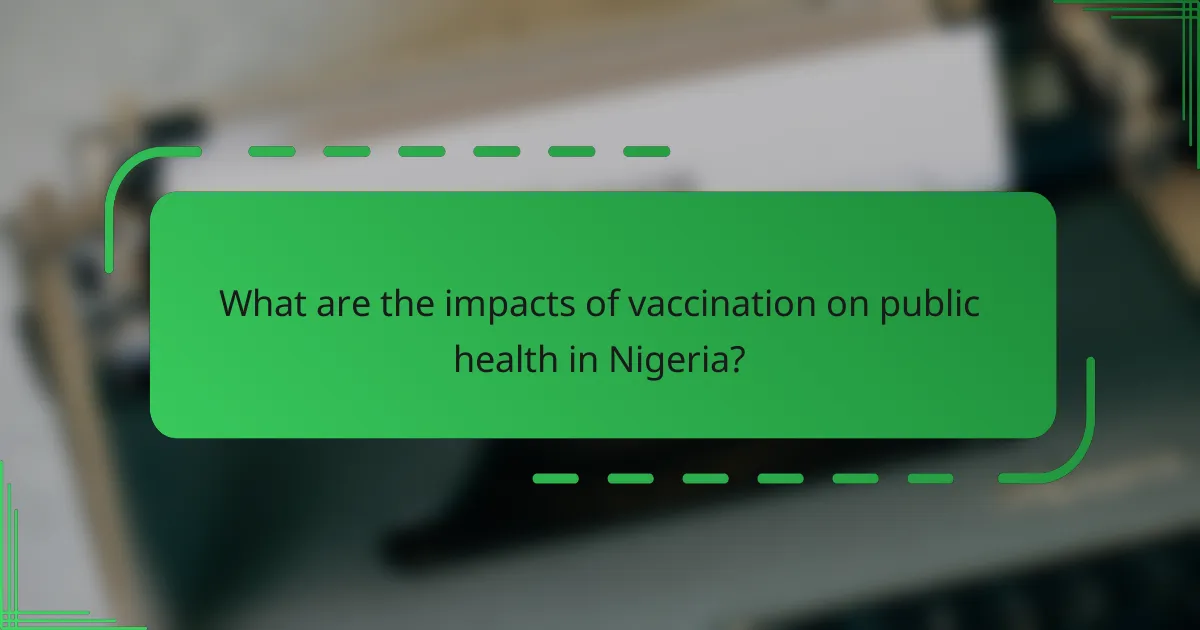
What are the impacts of vaccination on public health in Nigeria?
Vaccination significantly enhances public health in Nigeria by reducing the prevalence of infectious diseases, lowering child mortality rates, and fostering community immunity. These benefits contribute to a healthier population and a more resilient healthcare system.
Reduction in disease outbreaks
Vaccination plays a crucial role in reducing disease outbreaks by providing immunity against various infectious diseases. For instance, widespread immunization against measles and polio has led to a marked decrease in reported cases in Nigeria.
By achieving high vaccination coverage, communities can establish herd immunity, which protects those who cannot be vaccinated, such as infants and individuals with certain health conditions. This collective immunity is essential for preventing outbreaks.
Improved child mortality rates
Vaccination directly contributes to improved child mortality rates by protecting children from life-threatening diseases. Vaccines such as those for diphtheria, tetanus, and pertussis have been shown to save countless lives in Nigeria.
Efforts to increase access to vaccines, especially in rural areas, have led to significant reductions in child deaths. Programs focused on educating parents about the importance of vaccinations are vital in sustaining this progress.
Enhanced community immunity
Enhanced community immunity is achieved when a significant portion of the population is vaccinated, reducing the overall spread of diseases. In Nigeria, initiatives aimed at increasing vaccination rates have demonstrated the effectiveness of this approach.
Community outreach programs that engage local leaders and health workers are essential for promoting vaccination. By fostering trust and providing accessible information, these programs help ensure that more individuals participate in vaccination efforts, ultimately benefiting public health.
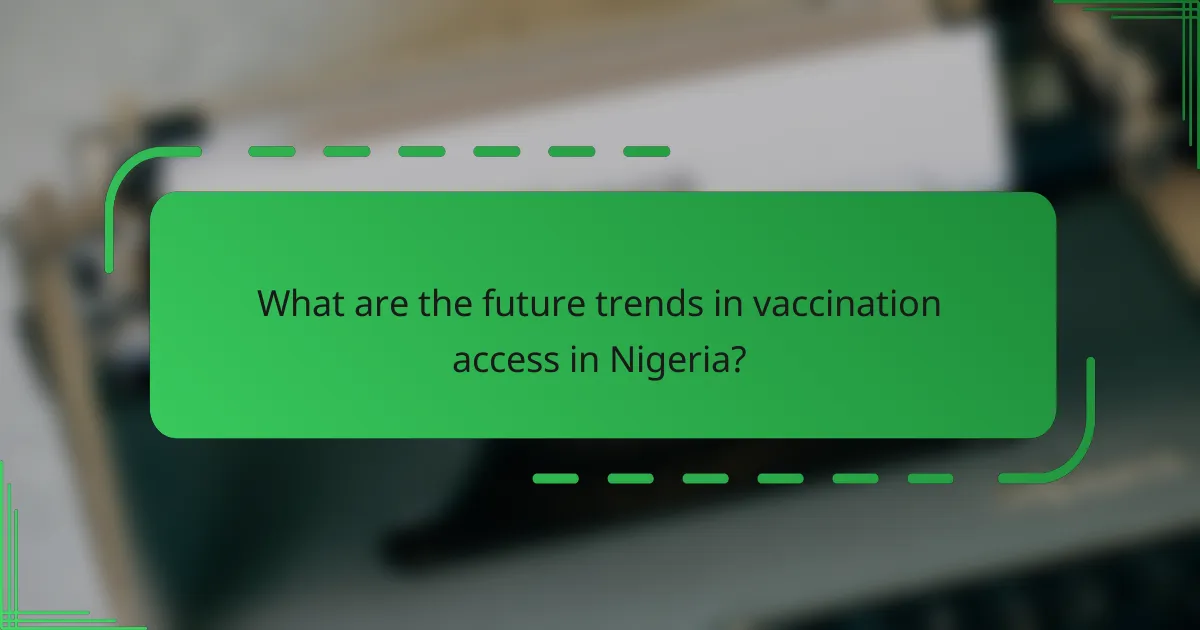
What are the future trends in vaccination access in Nigeria?
Future trends in vaccination access in Nigeria are likely to focus on leveraging technology, enhancing community engagement, and improving supply chain logistics. These developments aim to increase coverage and address existing barriers to vaccination.
Increased use of technology
Technology is playing a crucial role in improving vaccination access in Nigeria. Mobile health applications and digital platforms are being utilized to track vaccination records, schedule appointments, and send reminders to caregivers, which can significantly enhance participation rates.
Moreover, the use of data analytics helps identify areas with low vaccination coverage, allowing health authorities to target interventions more effectively. For instance, geospatial mapping can pinpoint communities that are underserved, enabling focused outreach efforts.
To maximize the benefits of technology, stakeholders should ensure that digital tools are user-friendly and accessible to all, including those in rural areas with limited internet connectivity. Training healthcare workers on these technologies is also essential to ensure smooth implementation and community trust.
